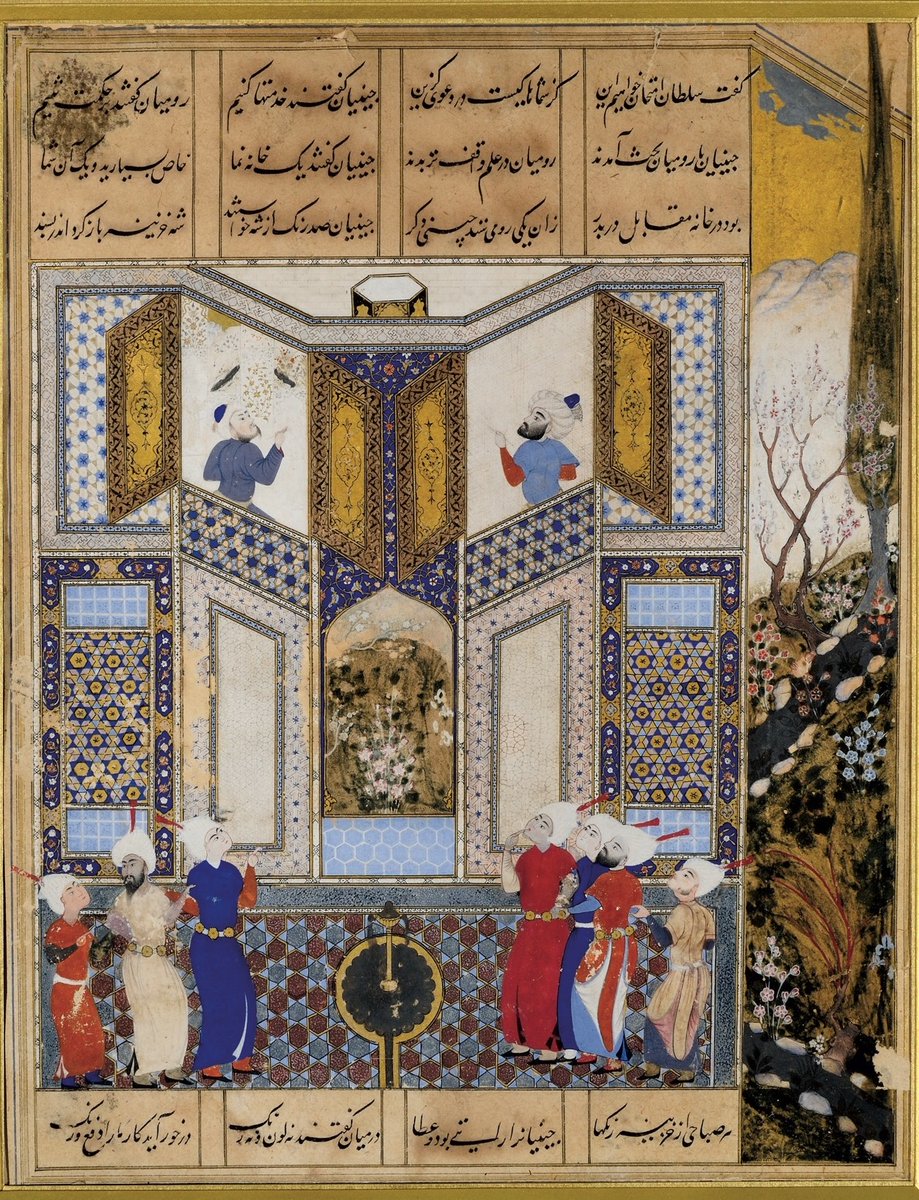My thesis shows the idea of " #China" was used as a cultural foil to #Iran in the 20th century, but this trope is much older. #Rumi tells of "The #Greek and #Chinese Painters"... (a thread) 1/
#iranchina #twitterstorians #history #poetry #persian #iranian @thesilkroad @iranstyle
#iranchina #twitterstorians #history #poetry #persian #iranian @thesilkroad @iranstyle
The story is from the Masnavi, one of the greatest #Persian poems, written in the 13th century. The image above is from a manuscript of the Masnavi from Tabriz, Iran, ca. 1540–50.
Without further ado, the story itself. Translation by Jawid Mojaddedi... 2/
Without further ado, the story itself. Translation by Jawid Mojaddedi... 2/
The competition between the Greeks and the Chinese in the art of painting
Once the Chinese said, ‘At art we’re the best!’
The Greeks said, ‘With more talent we’ve been blessed!’
The sultan said, ‘I’ll set a test for you
To see which of your claims is really true.’
3/
Once the Chinese said, ‘At art we’re the best!’
The Greeks said, ‘With more talent we’ve been blessed!’
The sultan said, ‘I’ll set a test for you
To see which of your claims is really true.’
3/
They all prepared to paint a room’s interior,
In knowledge though the Greeks were far superior.
‘Come, show us to a room,’ said the Chinese,
‘And give the Greeks one similar to it, please.’
4/
In knowledge though the Greeks were far superior.
‘Come, show us to a room,’ said the Chinese,
‘And give the Greeks one similar to it, please.’
4/
They found adjoining rooms which formed a pair,
One half for each group, thus completely fair;
Then the Chinese requested lots of paint,
The king supplied them, generous as a saint:
5/
One half for each group, thus completely fair;
Then the Chinese requested lots of paint,
The king supplied them, generous as a saint:
5/
Each dawn from his own storehouse men would bring
More paint for them as gifts from this kind king.
The Greeks said, ‘Colourful paints will not prove
Successful––colour’s what we must remove!’
6/
More paint for them as gifts from this kind king.
The Greeks said, ‘Colourful paints will not prove
Successful––colour’s what we must remove!’
6/
They closed their space off, polished every wall
Clear as the heavens up above us all;
Colour to colourlessness can change quite soon,
Colour’s a cloud, colourlessness the moon;
7/
Clear as the heavens up above us all;
Colour to colourlessness can change quite soon,
Colour’s a cloud, colourlessness the moon;
7/
If in the clouds some radiance should appear,
It’s from the sun and moon that it shines here.
Once the Chinese felt their work was complete
They banged their drums to celebrate this feat,
8/
It’s from the sun and moon that it shines here.
Once the Chinese felt their work was complete
They banged their drums to celebrate this feat,
8/
The king arrived and saw such paintings there
That stunned him, for their beauty was so rare;
Then he went to the Greeks, who quickly raised
The screen in front and left him more amazed:
9/
That stunned him, for their beauty was so rare;
Then he went to the Greeks, who quickly raised
The screen in front and left him more amazed:
9/
The image of that work which was so fine 3495
Reflected on the walls that they’d made shine––
Whatever he’d seen there shone on each wall,
Out of their sockets eyes began to fall!
10/
Reflected on the walls that they’d made shine––
Whatever he’d seen there shone on each wall,
Out of their sockets eyes began to fall!
10/
The Greeks stand for the Sufis clearly:
Without techniques from books of theory,
They’ve cleansed their breasts so well that they shine bright
Free from all stinginess, desire, and spite.
11/
Without techniques from books of theory,
They’ve cleansed their breasts so well that they shine bright
Free from all stinginess, desire, and spite.
11/
[...]
Polishers fled all colours, so they could
Each breath see what is beautiful and good:
Beyond the husk of knowledge they can see,
They’ve raised the banner of true certainty,
[...]
12/
Polishers fled all colours, so they could
Each breath see what is beautiful and good:
Beyond the husk of knowledge they can see,
They’ve raised the banner of true certainty,
[...]
12/
Rumi closes the poem by continuing to muse on the nature of Sufis and their special closeness to God. The story has little to do with China or Greece; instead, Rumi uses these characters to create a kind of ideal opposition between material splendor and spiritual reflection. 13/
In ancient #Iranian #poetry, the idea of #چین ( #China) was that of a far-off, mystical land of artistic skill and rare knowledge. While that idea changed in the 20th century, I show how the habit China as a " #Persian cultural mirror" continued:
14/
14/
You can hear there original read in Persian here, with a slightly more literal translation.
http://www.masnavi.net/3/25/eng/1/3465/
And that's all for today!
15/
http://www.masnavi.net/3/25/eng/1/3465/
And that's all for today!
15/
@peterfrankopan @jacoposcita @woodsidesusan2 @rowenarazak @iranstudiesUK @ardavank @sasanianshah @Rumi_Quote @RohamAlvandiLSE @ShazzShams
If you want to know more about my research, check out my article at @jadaliyya, where I talk about the "idea of #China in #Iran" in the 20th century. Or, ask me to see a copy of my thesis. Or, keep your eye out for my book! https://twitter.com/IranChinaGuy/status/1316467800819601409?s=20

 Read on Twitter
Read on Twitter


